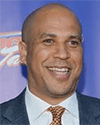Dem
52


Ties
1
GOP
47

- Strongly Dem (46)
- Likely Dem (2)
- Barely Dem (4)
- Exactly tied (1)
- Barely GOP (2)
- Likely GOP (2)
- Strongly GOP (43)
- No Senate race
New polls:
Dem pickups :
AZ CO IA ME MT NC
GOP pickups :
AL
The current breakdown of the Senate is as follows (where we count the two independents as Democrats):
- 12 Democratic seats up for reelection in 2020 and 35 seats not up, for a total of 47 seats
- 23 Republican seats up for reelection in 2020 and 30 seats not up, for a total of 53 seats
In a reversal from 2018, the Republicans will be playing defense, with many more seats up than the Democrats. The good news for the GOP is that most of these are in deep red states and are considered safe.
The Democratic-held seats are listed first below, in alphabetical order by state, with the Republican ones following.
Click on a picture for the candidate's webpage.
Click on a name for the candidate's entry in Wikipedia.
Click on a party (D) or (R) for the state party.
The  indicates a race to watch.
indicates a race to watch.
All links open in a new window. Type CTRL-W in the window to close it (Command-W on a Mac).
Democratic-held seats
Alabama
| Incumbent | Challenger | Notes Polls |

Doug Jones (D) |

Candidate unknown (R) |
Doug Jones looked like dead meat until God decided that child predator Roy Moore should try again for the seat he barely missed after Jeff Sessions foolishly gave up a lifetime job for a short stint as AG. Moore ran again in the primary and lost (badly). Bummer for soon-to-be-former-senator Jones. The July 14 Republican runoff is between Sessions and the Auburn Tigers football coach Tommy Tuberville. Tuberville got 33% of the vote in the primary to Sessions' 32%, so it could be close. There were four other candidates in the primary, so it matters who they vote for in July. Whomever wins the Republican runoff will be the new senator from Alabama. |
Delaware
| Incumbent | Challenger | Notes Polls |

Chris Coons (D) |

Candidate unknown (R) |
Chris Coons had the pleasure of running against Christine "I am not a witch" O'Donnell in a 2010 special election to fill the Senate seat that was vacated by Joe Biden when he became Vice President. In 2014, he won a full term by beating Kevin Wade (R) by 14 points. He will coast to an equally easy win in 2020. Delaware is a very blue state and the Republicans have no bench at all there, so he can serve another five or six terms in the Senate if he wants to. |
Illinois
| Incumbent | Challenger | Notes Polls |

Dick Durbin (D) |

Mark Curran (R) |
Dick Durbin is minority whip, the second most powerful position in the Senate Democratic caucus. He is also from a very blue state, Illinois. The Republicans nominated Lake County Sheriff Mark Curran, who used to be a Democrat. He will come out with his guns a blazin', but it won't matter. Durbin's fifth term is already in the bag. |
Massachusetts
| Challenger | Challenger | Notes Polls |

Candidate unknown (D) |

Candidate unknown (R) |
When then-President Barack Obama nominated Sen. John Kerry to be Secretary of State, it forced a special election for Kerry's seat. That was won by then-representative Ed Markey, who was positioned to spend as long as he wanted in the Senate, given how very blue Massachusetts is. He got 62% of the vote in 2014 and would do at least as well in 2020, now that he is better known. That is, if he makes it to the general election. Unfortunately for the senator, Rep. Joe Kennedy III (D-MA) threw his hat in the ring. Kennedy has big ambitions, a magic name, and lots of money, so he is a major threat to Markey. Polls give the Representative a lead of roughly 10 points over the Senator. The GOP bench is razor-thin, especially since Gov. Charlie Baker (R-MA) says he's not interested in running. That has left the red team with perennial candidate Shiva Ayyadurai, who is no real threat to either Markey or Kennedy. So, even if there's a bloody Democratic primary, the seat will stay in the blue team's hands. |
Michigan
| Incumbent | Challenger | Notes Polls |

Gary Peters (D) |

John James (R) |
Gary Peters won his first Senate term in 2014 when long-time senator Carl Levin retired. He is now running for his second term. Although Donald Trump carried Michigan in 2016 (by 11,000 votes), it is fundamentally a blue state and Peters shouldn't have too much trouble being reelected. That said, the GOP got their dream candidate in John James, who made Sen. Debbie Stabenow (D-MI) sweat a little in 2018. He's black, a veteran, a businessman, and quite charismatic, so maybe he can cobble enough votes together to make Peters sweat, too—especially with well more than a year to campaign. Still, in a presidential year, Peters remains the clear favorite. |
Minnesota
| Incumbent | Challenger | Notes Polls |

Tina Smith (D) |

Candidate unknown (R) |
Tina Smith won a special election in 2018 to fill out the rest of Al Franken's term. She didn't accept the appointment to the Senate with much enthusiasm, but she figured it was at least better than being lieutenant governor, a job whose only redeeming feature is that the governor might die in office. She campaigned and won in the 2018 special election. She's a team player and is running for a full term this year, even though being a senator was never her lifelong ambition. The state is blue enough for her to carry, even if she doesn't campaign much. |
New Hampshire
| Incumbent | Challenger | Notes Polls |

Jeanne Shaheen (D) |

Candidate Unknown (R) |
New Hampshire is one of the six states with two female senators. The others are Arizona, California, Minnesota, Nevada, and Washington. One of New Hampshire's two representatives is a woman and the previous governor was also a woman, so the Granite State is clearly a pretty friendly state for women in politics. Shaheen herself was the first woman elected as governor of the state. She was subsequently elected two more times as the state's chief executive before being elected to the Senate in 2008. She is safe, barring an unexpected run from a member of the Sununu family. Thus far, the Sununus have expressed no interest, and the leading Republican candidate is Brig. Gen. Donald Bolduc (ret.), who has an impressive military record, but no political experience. Barring a miracle campaign from him, that just won't get it done up against a popular incumbent in a bluish state. |
New Jersey
| Incumbent | Challenger | Notes Polls |

Cory Booker (D) |

Candidate unknown (R) |
When Frank Lautenberg died in office at 89 in 2013, Gov. Chris Christie called a special election, which Newark Mayor Cory Booker won. He was easily elected to a full term in 2014 and is up for reelection in 2020. This caused a problem because he would then have to decide if he was going to run for president or for the Senate. Fortunately for him, the Democrats control the trifecta in New Jersey and they think Booker is a cool guy, so they conveniently changed state law to allow folks to run for president and senator at the same time. Now we now he isn't going to be elected president in 2020 so he will have to satisfied being elected senator again. |
New Mexico
| Challenger | Challenger | Notes Polls |

Ben Ray Lujan (D) |

Mark Ronchetti (R) |
Tom Udall is a mere stripling at 70, but he nonetheless decided to throw in the towel and retire. Rep. Ben Ray Luján (D-NM) is going to try to succeed Udall for a second time, having already taken over the Senator's House seat when he vacated it back in 2009. Luján is a strong favorite. The Republicans nominated former television broadcaster and Trump hugger Mark Ronchetti. He is against the Green New Deal, abortion, and crime. He is for gun rights and a wall between New Mexico and old Mexico. If former governor Susana Martinez had run, she would have been an underdog. Ronchetti is a a dead dog. |
Oregon
| Incumbent | Challenger | Notes Polls |

Jeff Merkley (D) |

Jo Rae Perkins (R) |
Jeff Merkley won a very narrow victory over then-senator Gordon Smith in 2008. He has since been a high-profile progressive and one of the leaders of the fight to abolish the filibuster. Oregon is a liberal state, and a young (62) progressive with clear left-of-center positions on many issues is certainly the overwhelming favorite. The Republicans are trying to help him. They nominated Jo Rae Perkins. She is against abortion and wants to deport undocumented immigrants. She also wants to abolish the Federal Reserve, the federal income tax, Social Security, and Medicare. Note to Jo Rae if you read this: You are are running in Oregon. You are not running in Alabama. Please update your platform accordingly. Sincerely, the EVP editors. |
Rhode Island
| Incumbent | Challenger | Notes Polls |

Jack Reed (D) |

Allen Waters (R) |
Jack Reed is a low-profile guy who avoids the media and concentrates on service to his constituents. They apparently like that, since they elected him to his fourth term in the Senate in 2014 with 71% of the vote. In 2008 he got 73%. Usually the Republicans can find some self-funding candidate who thinks it would be neat to run for the Senate. This time they couldn't even find one of those, so the nomination fell to Allen Waters, who had $3,465 cash on hand at the end of the Q1. Reed had over $3 million. As you might have learned back in fifth grade, Rhode Island is not a terribly big state and you don't need a lot of money to run in it, but $3,000 is a bit on the meager side. Maybe Waters' message of school choice, repealing the federal income tax, and eliminating government-back student loans for college students will fly in Rhode Island. Maybe pigs will fly in Rhode Island. The latter is definitely a better bet. |
Virginia
| Incumbent | Challenger | Notes Polls |

Mark Warner (D) |

Candidate unknown (R) |
Multimillionaire Mark Warner, the former governor of Virginia, has announced that he intends to stay in the Senate. Virginia has long since ceased being a swing state and has become a blue state, like Maryland. The combination of being from a now-blue state, being an incumbent, and having unlimited personal campaign funds means that Warner is a shoo-in for his third term. |
Republican-held seats
Alaska
| Incumbent | Challenger | Notes Polls |

Dan Sullivan (R) |

Candidate unknown (D) |
Alaska politics are a bit strange. A write-in candidate (Lisa Murkowski) was elected to the Senate in 2010 after she lost the Republican primary and an independent (Bill Walker) was elected governor in 2014. Then there was the matter of Sarah Palin coming from nowhere to be elected governor in 2006, and then resigning before her term was up so she could could get a better-paying gig on Fox News following her disastrous vice presidential campaign in 2008. Alaska ranks eighth in the list of states dependent on federal money, despite widespread resentment of big gubmint. The technical term for this is "biting the hand that feeds you." That all said, the Last Frontier State is fairly Republican and the Democratic bench is not deep, so Sullivan will probably get another term. |
Arizona 
| Incumbent | Challenger | Notes Polls |

Martha McSally (R) |

Mark Kelly (D) |
Air Force veteran Martha McSally was appointed to John McCain's seat in 2018 after she lost the race for Jeff Flake's seat. Democrats smell blood in the water here and will give her a very tough fight. Democrats avoided a primary by pressuring Rep. Ruben Gallego (D-AZ) into not running. Consequently, the Democratic nominee will be former astronaut and naval aviator who saw combat in the Gulf War, Mark Kelly. He is also the husband of former representative Gabrielle Giffords. If you combine war veteran with astronaut, you get someone who will command a lot of respect in a state full of veterans. It should be a close race, but remember that McSally already lost a Senate race in a conservative state to an openly bisexual woman with no military experience, and now she faces a veteran whose military record is as strong as hers. Fundraising on both sides has been off the charts, and Kelly (#1) and McSally (#2) led all Senate candidates in terms of Quarter 2 receipts (April 1 - June 30), with about $9 million between them. In Q3, Kelly raised an astonishing $6 million. In the upcoming air war between Kelly and McSally, the Navy is going to be carpet bombing the Air Force into oblivion. |
Arkansas
| Incumbent | Challenger | Notes Polls |

Tom Cotton (R) |

No Democrat (D) |
Tom Cotton is running for reelection and no Democrat bothered to file to challenge him. There is a Libertarian Party candidate in the race as well as an independent, but Cotton is sure of a second term. |
Colorado 
| Incumbent | Challenger | Notes Polls |

Cory Gardner (R) |

John Hickenlooper (D) |
Colorado is turning blue and Cory Gardner is going to be one of the Democrats' top three targets (along with Martha McSally in Arizona and Susan Collins in Maine). The blue team has won every presidential, senatorial, and gubernatorial race since 2008, with the exception of Gardner's race in 2014. The Democrats got their dream candidate when former governor John Hickenlooper dropped out of the presidential race and threw his hat into the ring for the Senate race. Early polls give Hickenlooper a double-digit lead. Hickenlooper's main primary challenger is Andrew Romanoff, leader of Colorado's progressives and former speaker of the Colorado House. The pandemic is going to hurt Romanoff because as a former two-term governor, Hickenlooper is far better known than Romanoff. Once Romanoff is dispatched in June, Hickenlooper can focus on taking down Gardner, the most vulnerable Republican in the Senate. |
Georgia 
| Incumbent | Challenger | Notes Polls |

David Perdue (R) |

Candidate unknown (D) |
The Democrats' preferred candidate, Stacey Abrams, opted out, very possibly to remain available for the #2 slot on the blue team's presidential ticket. This leaves the Democrats searching for someone who can give Perdue a race. Maybe Jason Carter, grandson of former president Jimmy, who did very well in an off-year (2014) race for the Georgia governor's mansion? Or maybe Teresa Tomlinson, who served for two terms as mayor of Columbus, Georgia, a mid-sized city (194K population) near the Alabama border. She had a very successful run in that position, but at the moment her name recognition statewide is pretty low. But on Sept. 9, Jon Ossoff joined the race. He ran in a special election in GA-06 in 2017 and raised $23 million but narrowly lost. He will be a force to be reckoned with, especially if Carter and Michelle Nunn opt for running in the special election or don't run at all. |
Georgia-special 
| Challenger | Challenger | Notes Polls |

Candidate unknown (R) |

Candidate unknown (D) |
Johnny Isakson resigned from the Senate at the end of 2019. Gov. Brian Kemp (R-GA) appointed a successor, wealthy businesswoman Kelly Loeffler, who will have to stand for election in Nov. 2020. Appointed senators don't have a great track record, especially appointees who have never run for public office before. Loeffler is being challenged by Rep. Doug Collins (R-GA), who is a dyed-in-the-wool Trump lover, and whose entry into the race presages a nasty GOP establishment vs. GOP insurgent fight. On the Democratic side, the party appears to be coalescing behind Rev. Raphael Warnock, who has no political experience, but who leads one of the most prominent black churches in America. But first he has to beat Joe Lieberman's son, Matt Lieberman. If no candidate in the nonpartisan primary on Nov. 3 gets a majority of 50% + 1, there will be a runoff on Jan. 5, 2021. |
Idaho
| Incumbent | Challenger | Notes Polls |

Jim Risch (R) |

Paulette Jordan (D) |
Jim Risch has had an interesting history, running for lieutenant governor at a time when he was actually governor (as a result of a gubernatorial vacancy when then-governor Dirk Kempthorne resigned the governorship to become George W. Bush's secretary of the interior). In 2008, he ran for the Senate and won. In 2014 he ran again, and won in another landslide. The Democrats nominated Paulette Jordan, a Native American politican who is a member of the Coeur d'Alene Tribe. She served in the Idaho state House from 2014 to 2018 and unsuccessfully ran for governor in 2018. Now she can add "Unsuccessfully ran for senator in 2020" to her C.V. |
Iowa 
| Incumbent | Challenger | Notes Polls |

Joni Ernst (R) |

Theresa Greenfield (D) |
This race will another one of the Democrats' top targets. Ernst beat a relatively unknown congressman, Bruce Braley, in 2014, a non-presidential year. In a presidential year, with its generally higher Democratic turnout and people unhappy about Donald Trump's trade wars (which have hurt Iowa farmers), it could get exciting. Her 2014 campaign ad about how she was going to cut pork because she grew up on a farm and castrated hogs as a kid was a real winner, but she made her point and it would get tiresome if she used it again. That said, Ernst does have pretty high approval ratings (mid-50s) in Iowa. The Democratic candidate is Theresa Greenfield, who unsuccessfully ran for the House in 2018. She grew up on an Iowa farm that was hit hard by the farm crisis of the 1980s, but managed to go to college. She got married and just as she was expecting her second child, her husband, a union electrictrian, was killed in an on-the-job accident. With help from the Social Security survivor's benefits she got through. She later worked as an urban planner and in real estate development. She is leading in fundraising, but dollars aren't the same as votes. Still, in a blue wave, she has the kind of don't-give-up story that will play well in Iowa. |
Kansas 
| Challenger | Challenger | Notes Polls |

Candidate unknown (R) |

Barbara Bollier (D) |
Pat Roberts has decided to call it quits. Four terms is enough for him, so he won't run for reelection in 2020. He is 82 and he just got a big farm bill through Congress, so there isn't a lot left on his agenda. He is an old-style, decent, hardworking conservative and knows no legislation is going to be passed until 2021 at the earliest, so why die in the saddle? In the running to replace him is former Kansas Secretary of State Kris Kobach (R), whose far-right politics and voter suppression thrill some Republicans, but are a bridge too far for others, even in the ruby red Sunflower State. That is the profile of someone with enough support to claim their party's nomination in the primary, but enough not to win in the general election, which is exactly what happened when he lost the Kansas governor's race to a Democrat in 2018. If Kobach claims the nomination, and he's certainly the favorite if Mike Pompeo decides to stay out of the race, the seat will be "in play," despite the fact that no Democrat has been elected to the Senate from Kansas since 1932. If Pompeo throws his hat in the ring, it will be a nasty fight between Kobach and Pompeo, but Donald Trump will actively back Pompeo, making him the favorite. The filing deadline in June 1. The Democrats will probably nominate Barbara Bollier, a former Republican state senator who switched and became a Democratic state senator in 2018. Against Kobach, she might just have a chance. |
Kentucky 
| Incumbent | Challenger | Notes Polls |

Mitch McConnell (R) |

Amy McGrath (D) |
As majority leader, in principle Mitch McConnell ought to have no trouble getting reelected. But even though he compromises very little with the Democrats, tea partiers consider that far too much. While Kentucky generally casts its electoral votes for the Republican candidate, three of the statewide officers are Democrats, so Kentuckians do vote for the blue team sometimes. More than sometimes, actually; 9 of the last 11 governors, including the current one, Andy Beshear, were Democrats. To face McConnell, the blue team got its dream candidate, retired Marine Corps pilot Amy McGrath, who nearly won a House race in a deep red district in 2018 and who is a great campaigner and fundraiser. There's enough anti-McConnell energy out there that she raised $2.5 million in the 24 hours after she declared, in fact. McConnell has already unleashed the attack dogs, including an anti-McGrath website called wrongpathmcgrath.com. He's also counting on presidential coattails, as Donald Trump is much more popular with Kentucky Republicans than their senator is. The Majority Leader is the favorite for now, but this race is also squarely on the "watch" list. |
Louisiana
| Incumbent | Challenger | Notes Polls |

Bill Cassidy (R) |

Candidate unknown (D) |
Bill Cassidy beat then-senator Mary Landrieu in the 2014 runoff 56% to 44%, ending her political career. There aren't a lot of top Democrats left in Louisiana, with the possible exception of Landrieu's brother, Mitch Landrieu, who has served as lieutenant governor and mayor of New Orleans. He might consider a Senate race to win back the seat his sister once held. |
Maine 
| Incumbent | Challenger | Notes Polls |

Susan Collins (R) |

Sara Gideon (D) |
Susan Collins belongs to a vanishing breed that once roamed New England like the buffalo in South Dakota: a somewhat moderate Northeastern Republican. She is personally popular in the state, but Democrats hate her with a passion because she talks like a moderate all the time but votes like a conservative Republican nearly always. They already have raised $4 million for her opponent. Collins has a big target on her back. The list of potential Democratic candidates is long but the clear favorite Sara Gideon, the Speaker of the Maine House of Representatives. Polling of the race gives Collins a shaky lead, but the Cook Political Report now has the race as a toss-up. |
Mississippi
| Incumbent | Challenger | Notes Polls |

Cindy Hyde-Smith (R) |

Mike Espy (D) |
Cindy Hyde-Smith won a special election in 2018 following the retirement of Thad Cochran. Now she has to run for a full term. The fellow she beat, former Secretary of Agriculture Mike Epsy, wants a rematch. He is better known now and Democratic turnout is likely to be higher in 2020 than it was in 2018. His ace in the hole is his race. Espy is black, as are 37% of Mississippians, the highest of any state. If he can get enough white suburban women who hate Donald Trump and are sure to vote to also vote for him, he has an outside shot at it. Also somewhat helpful on that front is Hyde-Smith's less-than-stellar record in that area, from her "public hanging" jokes to her sending her kids to an all-white "segregation" private school. Still, at the end, it's still Mississippi and Hyde-Smith is the favorite. |
Montana 
| Incumbent | Challenger | Notes Polls |

Steve Daines (R) |

Steve Bullock (D) |
Montana is very red in presidential elections, but purple in state elections. The governor, Steve Bullock, and the other senator, Jon Tester, are Democrats. Since WW II, there have been 24 Senate elections in Montana and Democrats have won 20, Republicans 4. The popular governor is running for a Senate seat now. For better or worse, he is on television all the time now giving information about the coronavirus and how he is dealing with it. If he comes off as a caring and competent leader, that could be enough to win the Senate race, especially if Donald Trump's expected margin of vicory is small. |
Nebraska
| Incumbent | Challenger | Notes Polls |

Ben Sasse (R) |

Chris Janicek (D) |
Ben Sasse's only fear was a primary challenge from the right, because he is often critical of Donald Trump. He got one, but beat back his challenger, Matt Innis, by a margin of 3 to 1. In the general election, he will face Democrat Chris Janicek. He is a small business owner from Omaha and about as liberal as a Democrat can plausibly be in Nebraska and not be laughed at. He is for affordable drug prices, helping farmers, dealing with climate change, and responsible gun ownership. William Jennings Bryan he's not, but like Bryan, he is going to lose. |
North Carolina 
| Incumbent | Challenger | Notes Polls |

Thom Tillis (R) |

Cal Cunningham (D) |
North Carolina is trending purple (Barack Obama won it in 2008) so this is going to be a competitive race. Both Gov. Roy Cooper (D) and AG Josh Stein (D) declined to challenge Tillis. Once that was clear, the state Democratic establishment lined up behind former state legislator Cal Cunningham but he was challenged by a progressive state senator, Eric Smith. Cunningham crushed Smith in the primary, so he will face Tillis in what is expected to be a tight, nasty, and exceedingly expensive race in November. Most prognosticators see it as a very tight race. |
Oklahoma
| Incumbent | Challenger | Special election |

James Inhofe (R) |

Candidate unknown (D) |
Inhofe is in like Flynn, if he runs, but he's 84. If he decides enough is enough, there are plenty of Oklahoma Republicans who would love to be a senator. The Democrats' bench here is fairly thin and the chances of success are microscopic, so it is going to be hard for the blue team to find a top candidate. |
South Carolina
| Incumbent | Challenger | Notes Polls |

Lindsey Graham (R) |

Jaime Harrison (D) |
Lindsey Graham has occasionally said things or done things that arch-conservatives do not like, so he could have been primaried, but he saw the light somehow, and it didn't happen. Recently, he has cuddled up to Donald Trump like no one else. The Democrats will run Jaime Harrison, the first black person to chair the South Carolina Democratic Party. South Carolina is a very conservative state, so Graham is the clear favorite, but recent polls show he may win by only 5 points this time vs. the 15 points he won by in 2014. |
South Dakota
| Incumbent | Challenger | Notes Polls |

Mike Rounds (R) |

Daniel Ahlers (D) |
The Democrats got lucky. They actually found someone prepared to run for the Senate and be crushed by Mike Rounds. He is a small businessman and a member of the South Dakota House. He seems like a nice guy, but nice guys finish last in South Dakota if there is a (D) after their name. |
Tennessee
| Challenger | Challenger | Notes Polls |

Candidate unknown (R) |

Candidate unknown (D) |
Lamar Alexander is retiring, so this is an open seat. In 2018, the Democrats ran a moderate former governor, Phil Bredesen, against a Trump-loving right-wing firebrand, Marsha Blackburn, and Blackburn won easily. The Democratic bench is basically empty, so whomever the Republicans nominate will be the next senator from Tennessee. |
Texas
| Incumbent | Challenger | Notes Polls |

John Cornyn (R) |

Mary Hegar (D) |
Beto O'Rourke came close to beating Ted Cruz in 2018. If he had tried again in 2020, with a more Democratic electorate, he might have had a chance. On the other hand, a lot of Republicans in Texas hate Cruz. Not many hate Cornyn. In any case, the point became (temporarily?) moot when O'Rourke decided not to try for a Senate seat again. The Democrats managed to recruit MJ Hegar instead, which was a coup for them. Like Amy McGrath in Kentucky, she is a veteran who almost managed to steal a deep-red House district in 2018. Now that Hegar is in, the DSCC wanted O'Rourke to stay out of the race and he did. Technically, Hegar has to win a runoff in July, but she is the overwhelming favorite. Winning the general election, however, is a different story. The last time a Democrat was elected to the Senate from Texas was 1988, when Lloyd Bentsen won his fifth term. Cornyn got 62% of the vote in the 2014 general election and is the clear favorite in 2020 as well. |
West Virginia
| Incumbent | Challenger | Notes Polls |

Shelley Moore-Capito (R) |

Candidate unknown (D) |
This is a very red state and the Democrats don't have a lot of potential candiates. Joe Manchin just won reelection, yes, but he is a very clever politician: He is economically quite populist and pro-union, but culturally very conservative. They don't make them like that any more, so it is hard to see who the Democrats might run against her. |
Wyoming
| Challenger | Challenger | Notes Polls |

Cynthia Lummis (R) |

Candidate unknown (D) |
Wyoming is one of the most Republican states in the country. Michael Enzi could probably be reelected even if he were caught in bed with both a live boy and a dead girl. If there were a dead buffalo in the bed, too, maybe some people might look askance, but would probably still vote for him in the end. But he decided that four terms was enough, so he is not running in 2020. Wyoming's sole representative, Liz Cheney (R), considered running and would have won had she done it. But she made a decision to stay in the House because she expects to become speaker if the Republicans win back control. As a consequence of her decision, former congressman (her choice of terminology) Cynthia Lummis, a hard-right conservative who supports Donald Trump 100%, will be the next senator from Wyoming. Maybe the Democrats will find a sacrifical lamb. Maybe they won't. It doesn't matter, really. |
